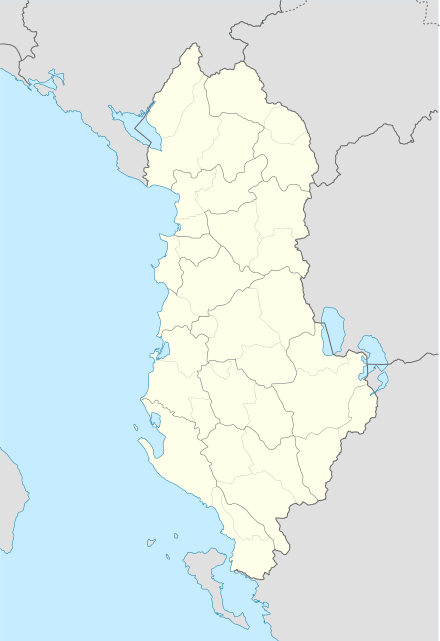Selckë
Selckë (Greek: Σέλτση) is a small village in the former Pogon municipality in the Gjirokastër County, southern Albania. At the 2015 local government reform it became part of the municipality Dropull.[1]
Selckë | |
|---|---|
 Selckë | |
| Coordinates: 40°6′27″N 20°17′42″E | |
| Country | |
| County | Gjirokastër |
| Municipality | Dropull |
| Municipal unit | Pogon |
| Time zone | UTC+1 (CET) |
| • Summer (DST) | UTC+2 (CEST) |
Geography
The village lies on the slopes of Mount Nemërçkë.[2] Selckë is considered as the southernmost village of the Lunxhëri region.[3] From a Greek point of view Selckë is considered as part of the Upper Pogoni (Greek: Άνω Πωγώνι) sub-region, which is the northern part of the wider Pogoni region, straddling both Albania and Greece.[2]
History
At 1868 a Greek school was already operating in the village.[4] In 1911–1913, Dimitrios Zervas, local benefactor and successful businessman, financially supported the local Greek schools and the Orthodox churches, he also offered scholarships to local students to attend the Phanar Greek Orthodox College, in Constantinople.[5] In the early 20th century, many inhabitants participated in late Ottoman immigration, but sent remittances home, helping the development of the village. During the interwar period Selckë had 35 houses with the inhabitants being Albanian speaking.[6] In the 1950s and 1960s, during the communist period many inhabitants moved to Tirana or other Albanian cities, and their houses were then occupied by Vlachs.[7]
In 1990 the village had 33 Vlach families and 32 native Lunxhot Orthodox Albanian families,[8] the former having been settled there as a result of the forcible relocations by the communist regime of People's Republic of Albania.[9] In 1992 it was reported that Aromanians were the overall majority.[10] Today, a part of the population has migrated, mostly to Greece, with Vlachs migrating at higher rates than natives, and often with no plans to return.[11]
According to official estimates (2014) part of the village is inhabited by the Greek minority.[12]
Notable people
- Pandeli Sotiri - teacher and Albanian Rilindja activist
- Dimitrios Zervas[5] - local benefactor and successful businessman
References
- Law nr. 115/2014 Archived 2015-09-24 at the Wayback Machine
- Koltsida, 2008, p. 90: "Πάνω Πωγώνι: ... περιλαμβάνονται τα χωριά... Σέλτση [Upper Pogoni: includes the villages of .... Selckë"
- De Rapper, 2005: p. 7.
- Koltsida, 2008, p. 172.
- Koltsida, 2008, p. 295: "Σέλτση... και το Αργυρόκαστρο."
- Hammond, Nicholas Geoffrey Lemprière (1967). Epirus: the Geography, the Ancient Remains, the History and Topography of Epirus and Adjacent Areas. Oxford: Clarendon Press. p. 213. ISBN 9780198142539.CS1 maint: ref=harv (link) "Selck, an Albanian speaking village of some thirty-five houses"
- De Rapper, 2005; p. 14.
- De Rapper, 2005; p. 14
- De Rapper, 2005: p. 13
- Kallivretakis, 1995. p. 34. "Στα πλαίσια της επιτόπιας έρευνας που πραγματοποιήσαμε στην Αλβανία (Νοέμβριος-Δεκέμβριος 1992), μελετήσαμε το ζήτημα των εθνοπολιτισμικών ομάδων, όπως αυτές συνειδητοποιούνται σήμερα επί τόπου. [As part of the fieldwork we held in Albania (November–December 1992), we studied the issue of ethnocultural groups, as they are realized today on the spot.]"; p. 51. "ΑΧ Αλβανοί Ορθόδοξοι Χριστιανοί, Β Βλάχοι"; p.57 "SELCKA ΣΕΛΤΖΚΑ/ΣΕΛΤΣΙ. 152 Β + αχ".
- De Rapper, 2005: p. 14.
- "Fourth Report submitted by Albania pursuant to Article 25, paragraph 2 of the Framework Convention for the Protection of National Minorities". Ministry of Foreign Affairs, Republic of Albania. p. 98. Retrieved 28 December 2018.
Sources
- Kallivretakis, Leonidas (1995). "Η ελληνική κοινότητα της Αλβανίας υπό το πρίσμα της ιστορικής γεωγραφίας και δημογραφίας [The Greek Community of Albania in terms of historical geography and demography." In Nikolakopoulos, Ilias, Kouloubis Theodoros A. & Thanos M. Veremis (eds). Ο Ελληνισμός της Αλβανίας [The Greeks of Albania]. University of Athens.
- Koltsida, Athina. Η Εκπαίδευση στη Βόρεια Ήπειρο κατά την Ύστερη Περίοδο της Οθωμανικής Αυτοκρατορίας (in Greek). University of Thessaloniki: 227–228. hdl:10442/hedi/23579. Cite journal requires
|journal=(help) - Gilles de Rapper. Better than Muslims, not as Good as Greeks: Emigration as experienced and imagined by the Albanian Christians of Lunxhëri The New Albanian Migration. Brighton-Portland, Sussex Academic Press (2005)
